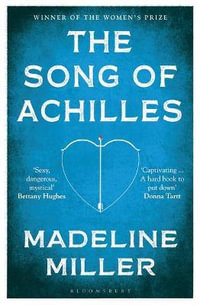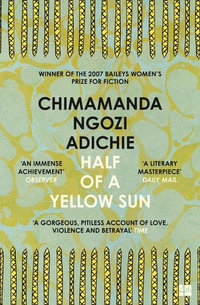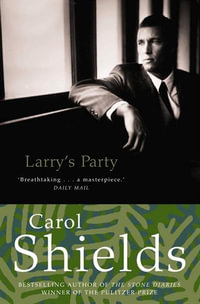
The Power
Winner of the 2017 Baileys Women's Prize for Fiction
By: Naomi Alderman
Paperback | 27 April 2017 | Edition Number 1
At a Glance
352 Pages
19.5 x 12.5 x 3
Paperback
RRP $22.99
$21.90
or 4 interest-free payments of $5.47 with
Longlisted for the 2017 Orwell Prize
What if the power to hurt were in women's hands? Suddenly - tomorrow or the day after - teenage girls find that with a flick of their fingers, they can inflict agonizing pain and even death. With this single twist, the four lives at the heart of Naomi Alderman's extraordinary, visceral novel are utterly transformed.
"Bold, accessible and beautifully written." - Tessa Ross, Baileys Prize Prize Chair 'She throws her head back and pushes her chest forward and lets go a huge blast right into the centre of his body. The rivulets and streams of red scarring run across his chest and up around his throat. She'd put her hand on his heart and stopped him dead.'
From the Author
My new novel, The Power, is a piece of feminist science fiction - or speculative fiction, or fiction about a fictional thing rather than a real thing (curious concept). In the novel, very suddenly almost all the women in the world develop the power to electrocute people at will. Anything from a tiny tingle all the way to full electro-death. And then everything is different.
The novel follows four main characters as they pick their way across this changed world. There's Roxy, the daughter of a London crime family with three older brothers; she was never supposed to take over the family business but she starts to have other ideas. There's Tunde, a young journalism student in Lagos, who sees that the revolution needs documenting, and gets himself into some dicey situations trying to be the one to do it. There's Allie, who comes from a troubled background in the South of the USA and sees that what people need is something new to believe in. And there's Margot, who was a low-level politician in New England but begins to have new ambitions.
It's a novel of ideas - what would happen if women had the power to cause pain and destruction? Do we really believe that women are naturally peaceful and nurturing? How much of gender is in our expectations of violence? But it's also a thriller; in pursuit of power each of the main characters will eventually come into conflict with the others, and they're each a force to be reckoned with.
At the novel's heart is the question of power: who has it, how do you get it, what does it do to you when you've got it? And when you wield the power, how long will it be before the power wields you?
About the Author
Naomi Alderman is the author of four novels. In 2006 she won the Orange Award for New Writers and in 2007 she was named Sunday Times Young Writer of the Year, as well as being selected as one of Waterstones' 25 Writers for the Future. All of her novels have been broadcast on BBC Radio 4's Book at Bedtime. In 2013 she was selected for the prestigious Granta Best of Young British Writers. She lives in London.
Industry Reviews
The Handmaid's Tale for the Gone Girl generation * Grazia *
A stone cold genius -- Sarah Perry
The Hunger Games crossed with The Handmaid's Tale * Cosmopolitan *
The Power is a subtly funny, lyrical and utterly subversive vision of an impossible future. As all the best visionaries do, Alderman shines a penetrating and yet merciful light on to our present and the so many cruelties in which we may be complicit -- A. L. Kennedy
Electrifying! Shocking! Will knock your socks off! Then you'll think twice, about everything -- Margaret Atwood
The Power is a fascinating look at what the world might be like if millennia of sexism went the other way...as a whole the narrative feels ingenious...deserves to be read by every woman (and, for that matter, every man) * The Times *
A feminist science-fiction story that's about to make waves * Red *
If you enjoy Margaret Atwood's dystopian fiction, this strong, substantial novel is for you * Woman & Home *
Alderman is a fluent and powerful writer * Sunday Times *
Thought-provoking novel * Glamour *
When we say that The Power is profoundly disturbing and you may well want to argue with it as you read, we mean that in a good way * SFX, Five Stars *
I loved it; it was visceral, provocative and curiously pertinent . . . The story has stayed with me since * Stylist, the decade's 15 best books by remarkable women *
As awesome as it is compulsive * Heat, 5 stars *
What starts out as a fantasy of female empowerment deepens and darkens into an interrogation of power itself, its uses and abuses and what it does to the people who have it * Guardian *
A raw, gutsy slice of speculative dystopia * Metro *
Like the best science fiction, this dystopian feminist fantasy holds up a mirror to the here and now * Mail on Sunday *
A gripping read and a reminder of the true joy of a truly engaging story * Stylist *
Frenetic sci-fi novel * Daily Mail *
Naomi's super-charged, subversive novel....forcing you to rethink everything * Psychologies *
One of my favourite books of 2016 - clever, harrowing and thought-provoking -- Paula Hawkins, best-selling author of The Girl on the Train
Electrifying -- Margaret Atwood
It's a feminist dystopian page-turner of a thriller and I'm IN LOVE with it -- Marian Keyes
This year's Baileys winner is simultaneously a high-concept thought experiment and a rollercoaster, action packed read * Guardian *
The Power by Naomi Alderman is the feminist flipside to The Handmaid's Tale, asking what happens when women are suddenly the stronger sex * Evening Standard *
An enthrallingly told Cassandra-like prophecy from the ever-inventive Naomi Alderman * Observer *
This book sparks with such electric satire that you should read it wearing insulated gloves * Washington Post *
The Power is at once as streamlined as a 90-minute action film and as weirdly resonant as one of Atwood's own early fictions * Boston Globe *
In this fierce and unsettling novel, the ability to generate a dangerous electrical force from their bodies lets women take control, resulting in a vast, systemic upheaval of gender dynamics across the globe * New York Times Books of the Year *
It's a riveting story, told in fittingly electric language, that explores how power corrupts everyone: those new to it and those resisting its loss' * New York Times *
Jocelyn is on her bed, legs stretched out. She’s holding Mr Bear.
She’s a child, just a child.
‘I should have called,’ says Margot, ‘as soon as it started. I’m sorry.’
Jocelyn’s near to tears. Margot sits on the bed gently, as if not to tip her full pail over. ‘Dad says you haven’t hurt anyone, not badly.’
There’s a pause, but Jos doesn’t say anything, so Margot just keeps talking. ‘There were. . . three other girls? I know they started it. That boy should never have been near you. They’ve been checked out at John Muir. You just gave the kid a scare.’
‘I know.’
All right. Verbal communication. A start.
‘Was that the... first time you’ve done it?’
Jocelyn rolls her eyes. She plucks at the comforter with one hand.
‘This is brand new to both of us, OK ? How long have you been doing it?’
She mutters so low that Margot can barely hear, ‘Six months.’
‘Six months?’
Mistake. Never express incredulity, never alarm. Jocelyn draws her knees up.
‘I’m sorry,’ says Margot. ‘It’s just. . . it’s a surprise, that’s all.’
Jos frowns. ‘Plenty of girls started it before I did. It was. . . it was kinda funny. . . when it started, like static electricity.’
Static electricity. What was it, you combed your hair and stuck a balloon to it? An activity for bored six-year-olds at birthday parties.
‘It was this funny, crazy thing girls were doing. There were secret videos online. How to do tricks with it.’
It’s this exact moment, yes, when any secret you have from your parents becomes precious. Anything you know that they’ve never heard of.
‘How did you. . . how did you learn to do it?’
Jos says, ‘I don’t know. I just felt I could do it, OK . It’s like a sort of... twist.’
‘Why didn’t you say anything? Why didn’t you tell me?’
She looks through the window to the lawn. Beyond the high back fence, men and women with cameras are already gathering.
‘I don’t know.’
Margot remembers trying to talk to her own mother about boys or the stuff that happened at parties. About how far was too far, where a boy’s hand should stop. She remembers the absolute impossibility of those conversations.
‘Show me.’
Jos narrows her eyes. ‘I can’t. . . I’d hurt you.’
‘Have you been practising? Can you control it well enough so you know you wouldn’t kill me, or give me a fit?’
Jos takes a deep breath. Puffs her cheeks out. Lets the breath out slowly. ‘Yes.’
Her mother nods. This is the girl she knows: conscientious and serious. Still Jos. ‘Then show me.’
‘I can’t control it well enough for it not to hurt, OK?’
‘How much will it hurt?’
Jos splays her fingers wide, looks at her palms. ‘Mine comes and goes. Sometimes it’s strong, sometimes it’s nothing.’
Margot presses her lips together. ‘OK.’
Jos extends her hand, then pulls it back. ‘I don’t want to.’
There was a time when every crevice of this child’s body was Margot’s to clean and care for. It is not OK with her not to know her own child’s strength. ‘No more secrets. Show me.’
Jos is near to tears. She places her forefinger and her middle finger on her mother’s arm. Margot waits to see Jos do something; hold her breath, or wrinkle her brow, or show exertion in the muscles of her arm, but there’s nothing. Only the pain.
She has read the preliminary reports out of the CDC noting that the power ‘particularly affects the pain centres of the human brain’, meaning that, while it looks like electrocution, it hurts more than it needs to. It is a targeted pulse which sets up a response in the body’s pain receptors. Nonetheless, she’d expected it to look like something; to see her flesh crisping and wrinkling, or to watch the arcing current, quick as a snake’s bite.
Instead, she smells the scent of wet leaves after a rainstorm. An apple orchard with the windfalls turning to rot, just as it was on her parents’ farm.
And then it hurts. From the place on her forearm where Jos is touching her, it starts as a dull bone-ache. The flu, travelling through the muscles and joints. It deepens. Something is cracking her bone, twisting it, bending it, and she wants to tell Jos to stop but she can’t open her mouth. It burrows through the bone like it’s splintering apart from the inside; she can’t stop herself seeing a tumour, a solid, sticky lump bursting out through the marrow of her arm, splitting the ulna and the radius to sharp fragments. She feels sick. She wants to cry out. The pain radiates across her arm and, nauseatingly, through her body. There’s not a part of her it hasn’t touched now; she feels it echo in her head and down her spine, across her back, around her throat and out, spreading across her collarbone.
The collarbone. It has only been a few seconds, but the moments have elongated. Only pain can bring such attention to the body; this is how Margot notices the answering echo in her chest. Among the forests and mountains of pain, a chiming note along her collarbone. Like answering to like.
It reminds her of something. A game she played when she was a girl. How funny: she hasn’t thought of that game in years. She never told anyone about it; she knew she mustn’t, although she couldn’t say how she knew. In the game, she was a witch, and she could make a ball of light in the palm of her hand. Her brothers played that they were spacemen with plastic ray-guns they’d bought with cereal-packet tokens, but the little game she’d played entirely by herself among the beech trees along the rim of their property was different. In her game, she didn’t need a gun, or space-helmet, or lightsaber. In the game Margot played when she was a child, she was enough all by herself.
There is a tingling feeling in her chest and arms and hands. Like a dead arm, waking up. The pain is not gone now, but it is irrelevant. Something else is happening. Instinctively, she digs her hands into Jocelyn’s patchwork comforter. She smells the scent of the beech trees, as if she were back beneath their woody protection, their musk of old timber and wet loam.
She sendeth her lightning even unto the ends of the earth.
When she opens her eyes, there is a pattern around each of her hands. Concentric circles, light and dark, light and dark, burned into the comforter where her hands clutched it. And she knows, she felt that twist, and she remembers that maybe she has always known it and it has always belonged to her. Hers to cup in her hand. Hers to command to strike.
‘Oh God,’ she says. ‘Oh God.’
ISBN: 9780670919963
ISBN-10: 0670919969
Published: 27th April 2017
Format: Paperback
Language: English
Number of Pages: 352
Audience: General Adult
Publisher: Penguin UK
Country of Publication: GB
Edition Number: 1
Dimensions (cm): 19.5 x 12.5 x 3
Weight (kg): 0.26
Shipping
| Standard Shipping | Express Shipping | |
|---|---|---|
| Metro postcodes: | $9.99 | $14.95 |
| Regional postcodes: | $9.99 | $14.95 |
| Rural postcodes: | $9.99 | $14.95 |
How to return your order
At Booktopia, we offer hassle-free returns in accordance with our returns policy. If you wish to return an item, please get in touch with Booktopia Customer Care.
Additional postage charges may be applicable.
Defective items
If there is a problem with any of the items received for your order then the Booktopia Customer Care team is ready to assist you.
For more info please visit our Help Centre.































